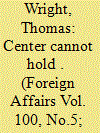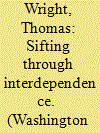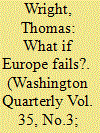|
|
|
Sort Order |
|
|
|
Items / Page
|
|
|
|
|
|
|
| Srl | Item |
| 1 |
ID:
182252


|
|
|
|
|
| Summary/Abstract |
Before the COVID-19 pandemic began, Washington was coalescing
around a new bipartisan consensus: great-power competition,
especially with China, ought to be the main organizing principle
of U.S. foreign policy. For some, the pandemic called that notion into
question by suggesting that transnational threats pose an even greater
danger to the American public than ascendant rival powers. Skeptics of
great-power competition, such as Senator Bernie Sanders, an independent from Vermont, argued that the United States should seek to deescalate tensions with China so that the two countries can work together
to manage borderless risks such as pandemics and climate change.
|
|
|
|
|
|
|
|
|
|
|
|
|
|
|
|
| 2 |
ID:
176435


|
|
|
| 3 |
ID:
147929


|
|
|
|
|
| Summary/Abstract |
Writing official strategy documents is hard. The United States produces a National Security Strategy and a Quadrennial Defense Review every four years, not to mention several other similar efforts. Many are dull, hit the lowest common denominator, reflect conventional wisdom, and are quickly forgotten. Students of strategy look back on a golden age of strategic planning – especially in the early Cold War – and ask why today’s planners cannot achieve those heights. There are at least two reasons.
|
|
|
|
|
|
|
|
|
|
|
|
|
|
|
|
| 4 |
ID:
136627


|
|
|
|
|
| Summary/Abstract |
Foreign policy experts have struggled to describe the unusual character of contemporary world politics. Much of the debate revolves around the concept of polarity, which deals with how power is distributed among nations, as experts ask if the United States is still a unipolar power or in decline as new powers emerge.1 The polarity debate, however, obscures more than it clarifies because the distribution of power does not determine the fate of nations by itself. It leaves out strategic choice and does not predict how the United States would exercise its power or how others would respond to U.S. primacy. World politics can take many paths, not just one, under any particular distribution of power. The most remarkable feature of post-Cold War world politics has not been the much-discussed power accumulation of the United States—although that is indeed noteworthy—but rather the absence of counter-balancing and revisionist behavior by other major powers.
|
|
|
|
|
|
|
|
|
|
|
|
|
|
|
|
| 5 |
ID:
126856


|
|
|
| 6 |
ID:
097097


|
|
|
|
|
| Publication |
2010.
|
| Summary/Abstract |
The word often used to describe President Barack Obama's approach to foreign policy is "engagement." Obama has expressed his instinctive willingness to talk to the enemies of the United States, promised a new era of engagement with the Muslim world, extended an olive branch to Iran, spoken of his desire to engage new partners in global governance, and articulated a vision of international politics premised on the existence of shared interests among nations. Yet, engagement is an amorphous and vague concept. Its purpose, parameters, and promise remain unclear. To some, it is a tactic, not a strategy.
|
|
|
|
|
|
|
|
|
|
|
|
|
|
|
|
| 7 |
ID:
090352


|
|
|
| 8 |
ID:
116602


|
|
|
|
|
| Publication |
2012.
|
| Summary/Abstract |
The European Union is engaged in a ferocious political, diplomatic, and economic struggle to preserve the future of the single currency, the Euro, and the viability of what has become known simply as "the project," namely the process of integration that has been the bedrock of Western European politics for over half a century. It is distinctly possible that its members' efforts may fail, either in the short or long term, and give way to an era of disintegration. Some have sounded the alarm: German Chancellor Angela Merkel famously remarked, "If the Euro fails, Europe fails."1 Former president Nicolas Sarkozy of France predicted, "If the euro explodes, Europe would explode. It's the guarantee of peace in a continent where there were terrible wars."2 Polish Foreign Minister Radek Sikorski warned the Euro's collapse could cause an "apocalyptic" crisis.3 Harvard economist Dani Rodrik cautioned "the nightmare scenario would … be a 1930's-style victory for political extremism." After all, "fascism, Nazism, and communism were children of a backlash against globalization."4 The erosion of democracy in Hungary and the rise in support for populist parties in Greece, the Netherlands, Finland, and France appears to some to be the beginning of the end.
|
|
|
|
|
|
|
|
|
|
|
|
|
|
|
|
|
|
|
|
|